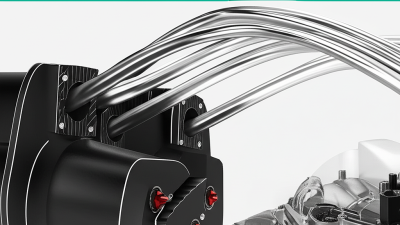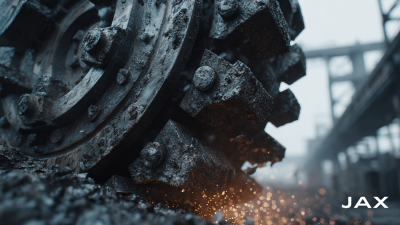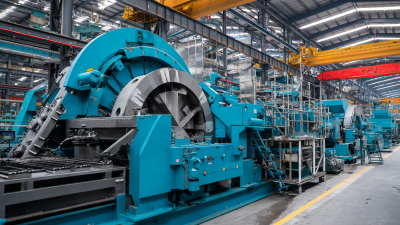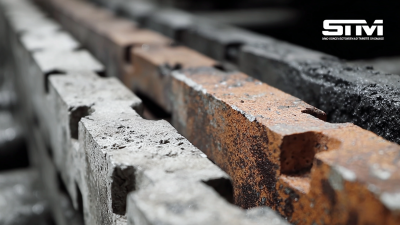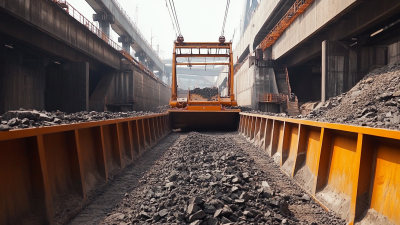 In industrial equipment, the significance of Fixed Jaws cannot be overstated, as they play a crucial role in ensuring operational efficiency and precision. According to a recent report by the International Journal of Advanced Manufacturing Technology, components like Fixed Jaws contribute to a remarkable 25% increase in the overall performance of material handling systems when optimized correctly. Notably, these components are integral to various applications, including hydraulic machines and conveyor systems, where stability and strength are paramount. As industries strive for higher productivity and lower operational costs, understanding the mechanics and benefits of Fixed Jaws becomes essential. This blog delves into key insights and data surrounding Fixed Jaws, illustrating their impact on industrial equipment and offering valuable examples that underscore their value in enhancing equipment reliability and performance.
In industrial equipment, the significance of Fixed Jaws cannot be overstated, as they play a crucial role in ensuring operational efficiency and precision. According to a recent report by the International Journal of Advanced Manufacturing Technology, components like Fixed Jaws contribute to a remarkable 25% increase in the overall performance of material handling systems when optimized correctly. Notably, these components are integral to various applications, including hydraulic machines and conveyor systems, where stability and strength are paramount. As industries strive for higher productivity and lower operational costs, understanding the mechanics and benefits of Fixed Jaws becomes essential. This blog delves into key insights and data surrounding Fixed Jaws, illustrating their impact on industrial equipment and offering valuable examples that underscore their value in enhancing equipment reliability and performance.
Fixed jaws play a crucial role in enhancing the reliability of industrial equipment. According to a recent report by the Machinery Reliability Institute, equipment failure rates can be minimized by up to 30% through the use of robust fixed jaw mechanisms. These components provide a stable foundation for the operation of various machines, ensuring that parts remain securely in place during use. This stability not only reduces wear and tear on moving parts but also enhances the overall safety of the operation, making fixed jaws an essential aspect of equipment design.
Furthermore, a case study published in the Journal of Industrial Engineering demonstrated that industries utilizing advanced fixed jaw designs experienced a 25% reduction in maintenance costs over a three-year period. By ensuring precise alignment and minimizing misalignment issues, fixed jaws help maintain the integrity and performance of machinery. As industries continue to prioritize reliability and cost-effectiveness, investing in high-quality fixed jaws will remain vital for achieving optimal equipment performance and longevity.

When it comes to industrial equipment, fixed jaws play a crucial role in ensuring stability and precision during operations. However, with frequent use, these components are susceptible to various types of failures that can disrupt workflow and lead to costly downtime. Understanding these common failures is essential for maintaining equipment efficiency and safety.
One prevalent issue is wear and tear due to repeated clamping and release actions, which can lead to deformation of the fixed jaws. This deformation results in misalignment, affecting the gripping force and potentially causing parts to slip or become damaged. Another significant concern is the accumulation of debris and contaminants that can interfere with proper seating.
Regular maintenance and cleaning are therefore vital to prevent this type of failure. Corrosion is also a major factor that can reduce the lifespan of fixed jaws. In environments where moisture and chemicals are present, unprotected jaws may rust, compromising their structural integrity and performance. Implementing protective coatings and using corrosion-resistant materials can mitigate these risks, ensuring that fixed jaws continue to function effectively even in harsh conditions.
Accurate monitoring and timely inspections are critical to identifying these issues before they escalate, safeguarding the performance of industrial equipment.
Worn or damaged fixed jaws can significantly impact the operational efficiency of industrial equipment. According to a survey conducted by the National Institute of Standards and Technology, approximately 30% of production downtime is attributed to the malfunctioning of critical components, including fixed jaws. These essential parts are designed to securely hold workpieces during machining processes, and any degradation in their integrity can lead to misalignment and increased cycle times. In fact, research from the Manufacturing Institute indicates that a mere 1% loss in operational efficiency can translate to a 10% increase in cost for manufacturers.
Moreover, the failure to regularly inspect and maintain fixed jaws can result in higher rates of scrap material and rework. A study from the American Society of Mechanical Engineers (ASME) reported that improper clamping caused by damaged jaws can lead to a 15% increase in material wastage. Industry experts recommend a preventive maintenance schedule that includes regular checks on fixed jaws to mitigate these risks. By prioritizing the upkeep of these components, businesses can enhance productivity, reduce costs, and maintain a competitive edge in the market.
Maintaining fixed jaws in industrial settings is crucial for ensuring operational efficiency and equipment longevity. Proper maintenance practices can significantly impact the performance of various industrial tools, including screening filters. As the fixed dry screening market is projected to experience a robust compound annual growth rate of 6.5% from 2024 to 2030, the effectiveness of fixed jaws in these applications becomes increasingly relevant. Operators must prioritize regular inspections and timely replacements of worn components, as neglect can lead to decreased productivity and increased operational costs.
Best practices for maintaining fixed jaws involve creating a routine maintenance schedule that includes cleaning, lubrication, and component checks. Keeping fixed jaws free from debris and contaminants not only enhances their functionality but also extends their service life. Additionally, training staff on the proper handling and troubleshooting of fixed jaw issues can prevent unexpected breakdowns and promote a safer work environment. By implementing these strategies, industrial operators can leverage the growth potential in the fixed dry screening market while ensuring their equipment remains in peak condition.
In the realm of industrial equipment, fixed jaws play a crucial role in ensuring stability and precision during operation. However, issues such as jaw clicking can pose significant challenges. Innovative solutions have emerged, leveraging modern technology to address these concerns effectively. A notable example comes from a user who struggled with chronic jaw clicking for an extended period. After consulting an AI platform, they discovered a quick fix that alleviated the problem almost instantly. This experience mirrors a growing trend where technology offers swift resolutions to long-standing mechanical issues.

Tips to manage fixed jaw-related problems include regularly inspecting the equipment for wear and proper alignment. Maintaining a clean workspace can also prevent debris accumulation that may contribute to operational disruptions. Furthermore, integrating AI-based diagnostic tools can provide ongoing support, identifying potential issues before they escalate. By embracing these innovative solutions, industries can enhance their operational efficiency, ensuring that fixed jaws serve their purpose without unnecessary complications.
